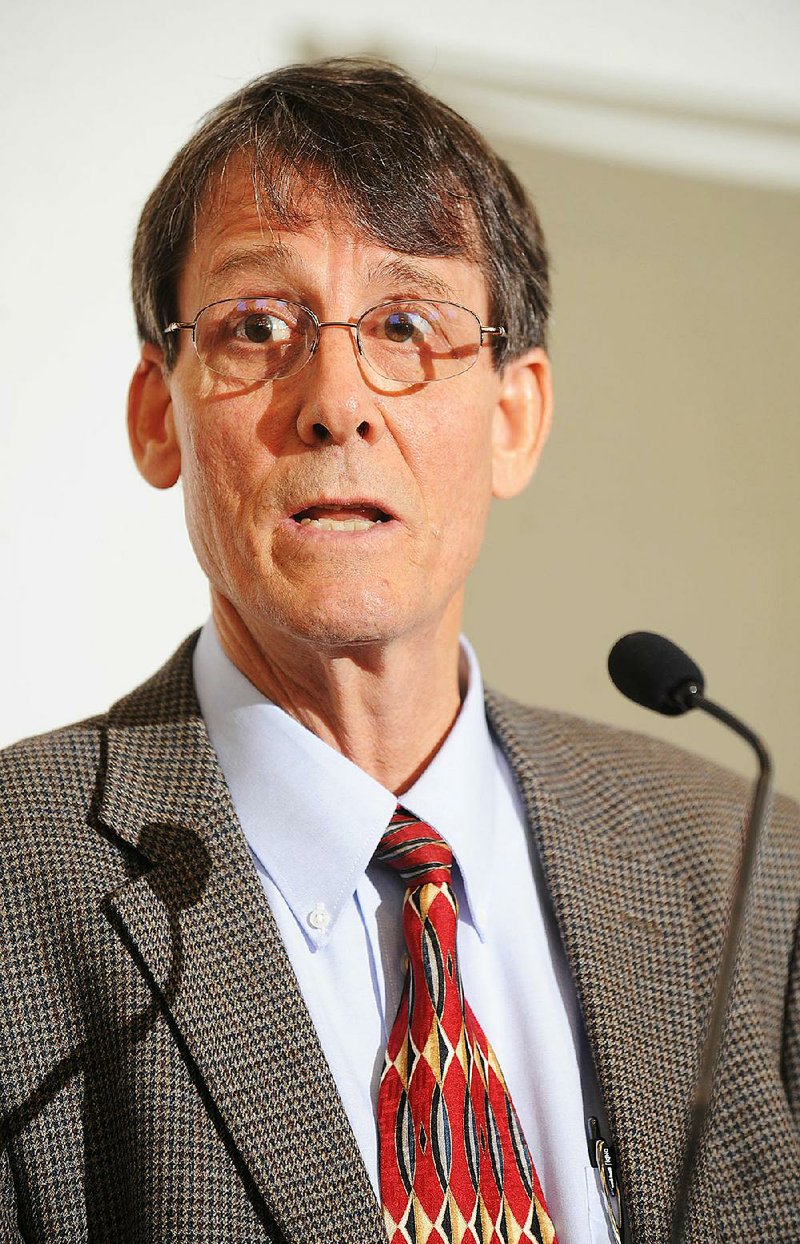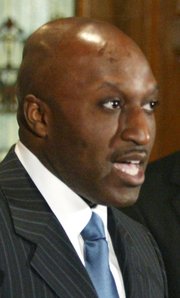The Youth Services Division presented several possible changes to Arkansas' juvenile-justice system Wednesday, including putting the division in charge of monitoring conditions and standardizing education and mental-health services in the state's 14 juvenile detention centers.
Youth Services Director Marcus Devine told members of the Youth Justice Reform Board that audits over the past year had found a great disparity in the care and services offered at the county-operated lockups.
"We have some that are amazing and some that are not so much. We want to make sure that the youths have the same level of services, no matter where they're arrested," Devine said.
Devine cautioned that the division doesn't want to operate the lockups.
In 2014, more than 8,600 children spent time in a county-operated juvenile detention center, according to division data. By comparison, only about 500 children were committed to state custody.
Devine said Republican Gov. Asa Hutchinson, the division's staff and some detention center administrators support the idea, saying the lockups and their staff members would benefit from more training, technical assistance and oversight from the state.
In addition to changes to juvenile-detention center monitoring, the Youth Justice Reform Board heard presentations on other states' efforts to reduce youth incarceration and an overview of Florida's civil citation program.
But giving the division more authority over the county-run centers and using state resources to add programs at the lockups met strong resistance from some board members.
Board member Madelyn Keith said the board should be focused on reducing the number of children sent to detention centers and the amount of time they're spending there, not trying to turn the lockups into another form of residential treatment.
Keith is executive director of East Arkansas Youth Services and president of the Arkansas Youth Service Providers Association.
She said she supports more monitoring but added that the Youth Services Division shouldn't get distracted by focusing on improving the lockups and forget about providing more alternatives to detention in underserved communities.
"The reason they look like jails is that they were supposed to be temporary," Keith said of the detention centers. "They were meant to be pre-adjudication facilities, not places where youth are sentenced to do time."
Paul Kelly, senior policy analyst for Arkansas Advocates for Children and Families, said that concentrating on adding programs to the detention centers appeared to contradict the board's mission.
Established by Act 1010 of 2015, the board is responsible for developing plans to reduce the number of children committed to state custody and incarcerated in secure facilities.
"Won't we be putting lipstick on a pig?" Kelly asked. "We'll be encouraging the use of incarceration. What you can do behind locked doors, you can do better in the community."
Scott Tanner, juvenile ombudsman for the Arkansas Public Defender Commission, also questioned the division's ability to monitor the detention centers when he has concerns that it's not able to adequately monitor its own residential treatment centers.
Tanner also questioned whether the board should be making a change involving the oversight of the detention centers without getting input from the leaders of the facilities and other stakeholders.
The Youth Justice Reform Board includes a diverse group of people who work in the state's juvenile-justice system. It includes judges, public defenders, prosecutors, service providers, youth advocates, psychiatrists and officials from the Human Services and Education departments.
The board does not include a representative from the detention centers, but it heard from one lockup administrator Wednesday.
Sebastian County Juvenile Detention Center administrator Fran Hall told the board that she supports standardizing the education and mental health services that are offered in each facility.
"I don't think juvenile detention centers should be just jails. Mine isn't," Hall said. "We have a great educational program. I think if all the JDCs are on the same page, then they'll be more than just a jail."
Devine said he understood the board members' concerns, but he believes that the board should consider the proposal as it looks to make changes to the juvenile-justice system.
"We have to deal with the reality that is," Devine said. "You can't turn a blind eye to the kids in the JDCs."
Over the past year, the division has stepped up its monitoring of the five juvenile detention centers that under a written agreement house children in state custody.
The increased monitoring came after the Arkansas Democrat-Gazette published a series of articles last year that detailed a troubling pattern at the Yell County Juvenile Detention Center in Danville, which houses children in state custody.
For years, guards at the facility used mechanical restraints, a full-body restraint known as The Wrap and pepper spray to punish boys and girls for minor, nonthreatening misbehavior, the newspaper found.
Over the past several months, the Yell County lockup has overhauled how it treats inmates. The facility's new director, Mike May, has implemented a reward-based system, and the division has said it has seen the culture of the facility transformed.
The division also has had problems at the White River Juvenile Detention Center in Batesville where a division internal investigator found staff members were using isolation as punishment.
That facility is still under increased scrutiny from the division after a lockup staff member was arrested last summer and accused of having sex with an inmate and exposing the child to HIV.
The division doesn't currently have authority to monitor the other nine juvenile detention centers even though those facilities often house children who later end up in state custody.
The other nine facilities are reviewed annually by the Criminal Detention Facilities Review Committees. The committees, coordinated by the Department of Finance and Administration, are the same groups that inspect adult jails.
Carmen Mosley-Sims, the division's assistant director for community services, said the review committees don't use standards as rigorous as those the division applies to its facilities.
Mosley-Sims told the board that over the past several months, her staff audited all 14 lockups and unearthed multiple deficiencies.
Many of the juvenile detention centers lack adequate education services, Mosley-Sims said.
"Kids are losing a lot of ground in education in the JDCs. This is an area in the JDCs that a lot of them need more support than they're getting," she said.
Mosley-Sims said division inspectors also found a lack of training for lockup staff members and inadequate background-check procedures.
Most of the juvenile detention centers conducted criminal background checks on their employees, but many weren't checking the state child-maltreatment registry for past findings of child abuse or neglect, she said.
Auditors also found that nearly all of the detention centers lacked adequate mental health services, she said. And many facilities don't have a system to get children with disabilities the help they need.
"If they don't provide the services that the kids need, then they're not going to get them," Mosley-Sims said.
In addition to the discussion of youth-lockup monitoring, the board also heard a presentation from the Pew Charitable Trusts on efforts to reduce youth incarceration in other states.
The division is considering working with the group to analyze the state's juvenile-justice system.
LaShunda Hill of the Pew Charitable Trusts told the board that juvenile commitments nationally have declined in recent years from 256 children per 100,000 in 1997 to 133 children per 100,000 in 2011.
"As we're seeing states reduce juvenile commitment rates, we're also seeing decreases in juvenile arrests and juvenile crime," Hill said.
But Arkansas has lagged behind in reducing commitments compared with other states, including neighboring states like Texas and Tennessee as well as Georgia, which she said had seen "enormous success."
These states have also seen reductions in recidivism by keeping lower-risk children in their communities and reserving secure confinement for children who pose a high risk of harm to the community, she said.
Henry Thompson of the Youth Services Division gave an overview of Florida's civil citation program, which allows police officers to write citations to first-time, misdemeanor offenders.
The citations don't count as arrests but rather require the child to meet with a juvenile-intake officer, who assesses them for needs such as substance-abuse treatment or counseling.
Thompson said the civil citation program has proved effective in keeping low-risk children from getting deeper into criminal behavior.
Devine said the division wants the board to look at Florida's system to see if parts of it could be implemented in Arkansas.
"We want to make sure that we're getting the right child in the system for us to serve, not the wrong kids," Devine said.
The board's next meeting is scheduled for Jan. 13. The board hopes to have draft legislation and recommendations for policy changes ready by next summer.
A Section on 10/01/2015

